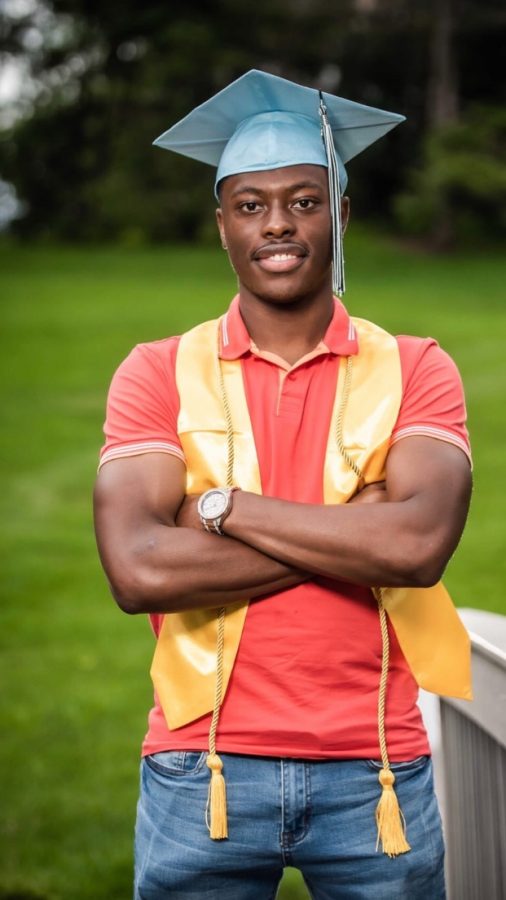Column: My freshman experience as a minority involves passions, thoughts, reflections and goals at Loyola
February 12, 2021
The combination of a sensitive election year and navigating a safe college experience forced me to be cognizant of real-life issues during my first year with the trials of COVID-19 on a college campus. I have mostly endured great experiences here at Loyola. I have a very diverse friend group that mimics my friendships at my high school. Since attending Loyola, one disheartening encounter comes to mind, pertaining to a conversation related to being a three-sport athlete.
After the dialogue with the school, the pre-law major in me began to research the statistics and comparison of all races of students that have participated in certain sports at Loyola. It’s one of the certainties that can only be sensed in the conversation dismissiveness and personal bias through my experience as an African-American male.
Prior to choosing Loyola, I had three other acceptances including one Ivy and two offers to play baseball at other colleges. The great No. 42 Jackie Robinson played during a time of “Jim Crow laws.” He had to endure ignorance in his era to ensure a young man such as himself had opportunities. This is a battle to bring light to the bias of race, a movement in which I’m certain that my education will make change in in due time.
It’s my opinion that there should be a more prominent level of diversity and a safe space to speak on feelings in a positive magnitude as minorities at Loyola. Effective communication allows for positive feedback and the opportunity for those who have been taught ignorance to open their minds. Adapting to campus life wasn’t the fear that paralyzed me, my fear was going off-campus.
As I witnessed the viral video of George Floyd saying “I can’t breathe” and calling for his mother, I cringed. This occurrence ended without proper justice, in my opinion. That video showed me that even though I’m a pre-law student with a positive force in society and no criminal record, my life wasn’t worth it if I was pulled over for simply walking down a street.
My parents’ concern about this resulted in the purchase of recording devices for my car and for my safety.
I chose Loyola after knowing I have a greater calling to become an attorney or judge and to work on reform against the negative algorithms that convict more African-Americans due to social and financial status.
Kalief Browder spent three years at Rikers Island only to be found not guilty. He could not afford proper counsel. When finally released, his life within prison was too much to relive each day. Kalief later committed suicide.
As a future judge, I’m hopeful in bringing light to the greater need for justice and equality for all.
There’s a grave number of minorities that are disproportionally affected by poverty. Barack Obama said, “One voice can change a room, and if one voice can change a room, then it can change a city, and if it can change a city, it can change a state, and if it can change a state, it can change a nation, and if it can change a nation, it can change the world. Your voice can change the world.”
In future endeavors, I plan to create a backpack program to combat hunger named “SMITH PACKS.” A child will not focus on their studies if they’re hungry.
The final reason I chose Loyola was for the missionary aspect of the Jesuit school. After the year we’ve had in 2020, with constantly adapting to daily deaths, division, ignorance and the insurgence at the capital, a seed of bias has shown us our generation has to wake up and fight against the spirit of separation.
Overall, my experience has been positive even amidst COVID-19. I enjoy my professors, counselors and the new acquaintances I have met on campus.
It’s important that I stand on the shoulders of my ancestors and those such as Martin Luther King Jr. and John Lewis. They were brave and noble, even in the face of death. It’s important to have dignity and walk in the shoes of those who continue to shatter the ceiling such as Kamala Harris.
Let’s recall that the Civil Rights Act of 1964 was not just for African-Americans but also a step forward against the oppression of women of all races. There’s still a fight as we speak in 2021 for our mothers, sisters and friends to receive equal pay.
We should all ask ourselves: How am I contributing to a better world? What small milestones am I achieving as a student for my brethren each day? How will my actions here at Loyola help those that will follow my footsteps behind me?
This past year should motivate us all to become more unified and compassionate human beings.
John Lewis said: “I believe that you see something that you want to get done, you can’t give up, and you cannot give in.”








Impressed • Feb 14, 2021 at 4:52 pm
You are right we are in need of more leadership to speak for the voiceless & so many communities need help. There are also many levels of sports in which African Americans are mis represented such as baseball & rugby. I would like to know the statistics of the sincere recruitment of African American baseball players at Loyola? How can we gain that data? It is great to see your head is clear and your heart is one to help get in the trenches and fight for equality for all. So true regarding women and equal pay! We have to all ask ourselves how are we making the world a better place. Education is the key!! Great article! Going to keep a eye out for you may have to vote for you one day!!